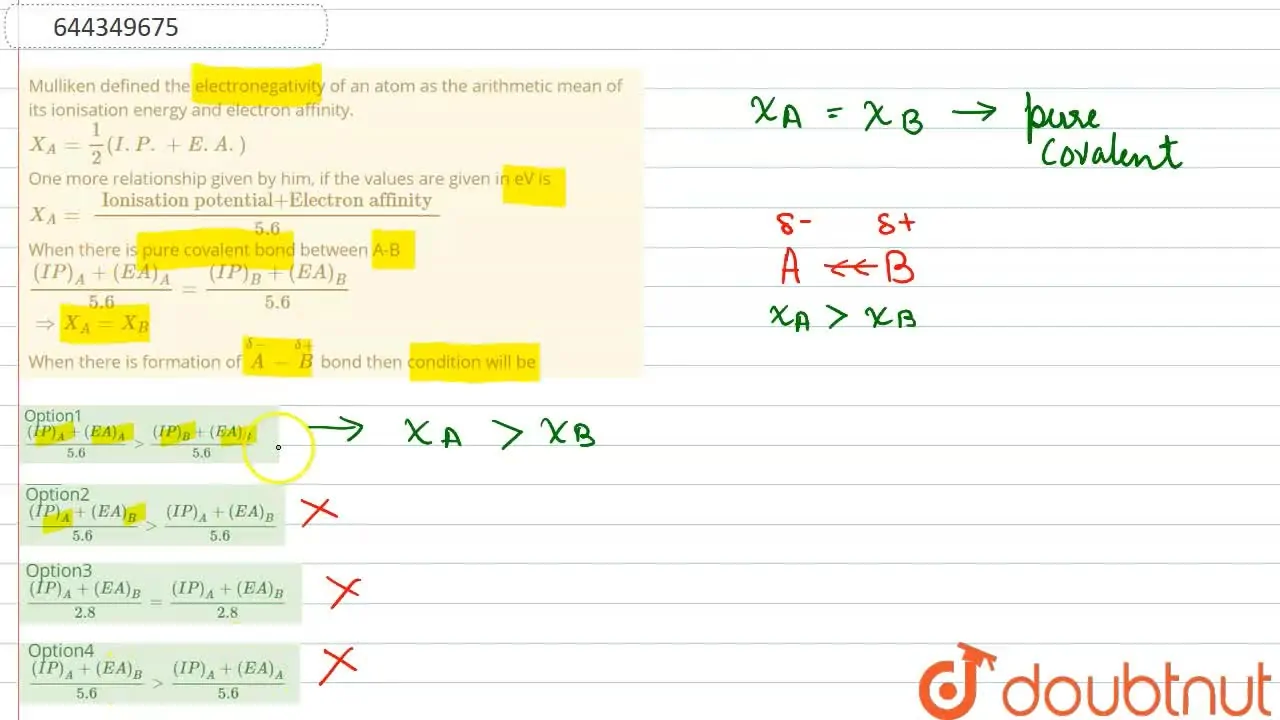Mulliken defined the electronegativity of an atom as the arithmetic mean of its ionisation energy and electron affinity.
XA=12(I.P.+E.A.)
One more relationship given by him, if the values are given in eV is
XA=Ionisation potential+Electron affinity5.6
When there is pure covalent bond between A-B
(IP)A+(EA)A5.6=(IP)B+(EA)B5.6
⇒XA=XB
When there is formation of δ−A−δ+B bond then condition will be
(IP)A+(EA)A5.6>(IP)B+(EA)B5.6
(IP)A+(EA)B5.6>(IP)A+(EA)B5.6
(IP)A+(EA)B2.8=(IP)A+(EA)B2.8
(IP)A+(EA)B5.6>(IP)A+(EA)A5.6
The correct Answer is:A
Step by step video & image solution for Mulliken defined the electronegativity of an atom as the arithmetic mean of its ionisation energy and electron affinity. X_(A)=(1)/(2)(I.P.+E.A.) One more relationship given by him, if the values are given in eV is X_(A)=("Ionisation potential"+ "Electron affinity")/(5.6) When there is pure covalent bond between A-B ((IP)_(A)+(EA)_(A))/(5.6)=((IP)_(B)+(EA)_(B))/(5.6) implies X_(A)=X_(B) When there is formation of overset(delta-)(A)-overset(delta+)(B) bond then condition will be by Chemistry experts to help you in doubts & scoring excellent marks in Class 12 exams.
Related Playlists
- BOOK - AAKASH INSTITUTE ENGLISHCHAPTER - CLASSIFICATION OF ELEMENTS AND PERIODICITY IN PROPERTIESEXERCISE - Assignment (Section -E assertion-Reason Type Questions)14videos
CLASSIFICATION OF ELEMENTS AND PERIODICITY IN PROPERTIES
- BOOK - AAKASH INSTITUTE ENGLISHCHAPTER - CLASSIFICATION OF ELEMENTS AND PERIODICITY IN PROPERTIESEXERCISE - Assignment (Section -F Matrix-Match Type Questions)4videos
CLASSIFICATION OF ELEMENTS AND PERIODICITY IN PROPERTIES
- BOOK - AAKASH INSTITUTE ENGLISHCHAPTER - CLASSIFICATION OF ELEMENTS AND PERIODICITY IN PROPERTIESEXERCISE - Assignment (Section -C)12videos
CLASSIFICATION OF ELEMENTS AND PERIODICITY IN PROPERTIES
- BOOK - AAKASH INSTITUTE ENGLISHCHAPTER - CHEMISTRY IN EVERYDAY LIFE EXERCISE - Assignment ( SECTION - A)45videos
CHEMISTRY IN EVERYDAY LIFE
- BOOK - AAKASH INSTITUTE ENGLISHCHAPTER - COORDINATION COMPOUNDS EXERCISE - Assignment (Section-J Aakash Challenger Questions )10videos
COORDINATION COMPOUNDS
Similar Questions
Mulliken defined the electronegativity of an atom as the arithmetic mean of its ionisation energy and electron affinity.
XA=12(I.P.+E.A.)
One more relationship given by him, if the values are given in eV is
XA=Ionisation potential+Electron affinity5.6
When there is pure covalent bond between A-B
(IP)A+(EA)A5.6=(IP)B+(EA)B5.6
⇒XA=XB
Pauling's Electronegativity scale is based onView SolutionMulliken defined the electronegativity of an atom as the arithmetic mean of its ionisation energy and electron affinity.
XA=12(I.P.+E.A.)
One more relationship given by him, if the values are given in eV is
XA=Ionisation potential+Electron affinity5.6
When there is pure covalent bond between A-B
(IP)A+(EA)A5.6=(IP)B+(EA)B5.6
⇒XA=XB
According to Mulliken, electronegativity depends onView SolutionDifferentiate between the following:
Ionisation energy and electron affinity.View SolutionOn Mulliken scale, the average of ionisation potential and electron affinity is known as ________.
View SolutionMg2+O2− is formed since : [IE = Ionization energy, EA = Electron affinity]
View SolutionIonisation energy and electron affinity of fluorine are respectively 17.42 and 3.45eV. Calculate electronegativity of fluorine atom.
View SolutionDiscuss the following trends in halogens.
(a) atomic radius
(b) ionisation potential
(c) electron affinity and
(d) electronegativity.View SolutionFor the reaction K(g)+F(g)+K⊕+FΘ (separated ions ΔH=19kcalmol−1), if the ionisation potential of K and the electron affinity of FΘ have a geometric means of 3.88eV and IP>EA, calculate the values fo ionisation potential and electron affinity.
View SolutionIf x,y and z are electronegativity, ionisation potential and electron−affinity respectively. Then the electron affinity (z) in the terms of electronegativity (x) and ionisation potential (y) will be :
View SolutionIonisation potential (IP) and ionisation (IE) are related a
View Solution


